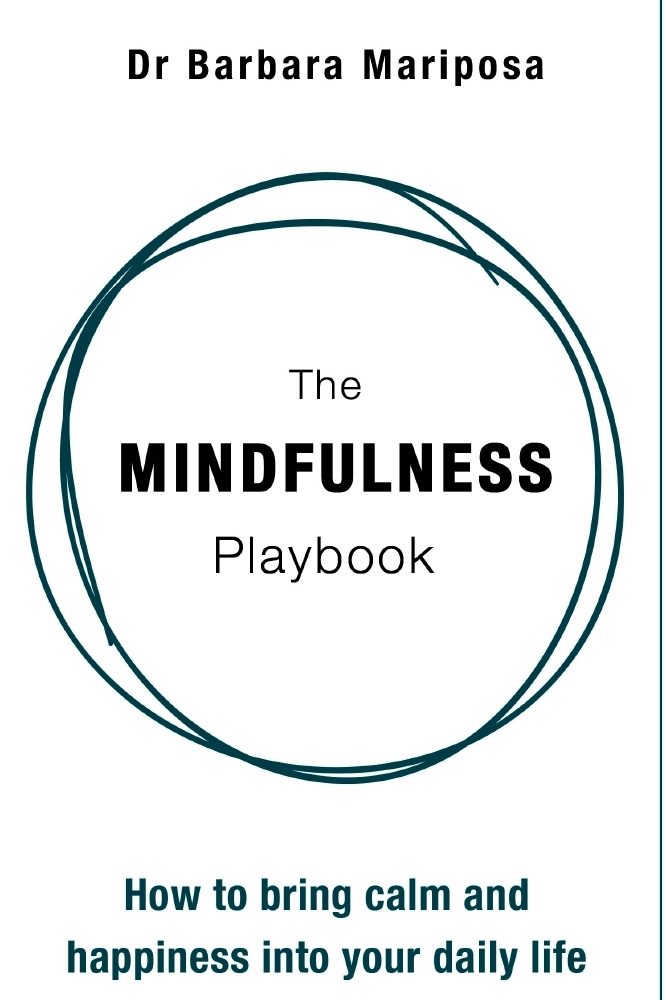from Dr. Barbara Mariposa, Specialist in Mindfulness & Wellbeing and author of new book, The Mindfulness Playbook.

The Mindfulness Playbook
Mindfulness is having a bit of a moment. Popular TV programmes show classes run by a lady in floaty clothing ringing temple bells. Or sitting in a full lotus yoga pose chanting “Om”.
As Mae West said, “There’s no such thing as bad publicity” but these portrayals might put you off. And I’m not surprised.
The good news is none of these images has much to do with mindfulness. Let’s get beyond the clichés and talk sense about mindfulness.
Mindfulness is a quick fix. It’s not. It has enormous benefits, helping you be more focused, calmer and balanced so your relationships, wellbeing and sense of clarity will improve. But it takes regular practice over a period of weeks to see these benefits.
Mindfulness fixes everything. It’s doesn’t. You’ll feel clearer and better about yourself, so you cope better with life’s challenges, and stress-related health problems can improve. But it’s not some global panacea which miraculously disappears life’s ups and downs.
Mindfulness is for everyone. It’s not. Some people find it incredibly difficult to sit still and the pressure to do so can be counterproductive, making them feel like failures, especially if they excel in self-criticism. Some people just don’t take to it and that’s fine.
Mindfulness is easy. Not true. It takes self-discipline, perseverance and patience. The good thing is that, by developing these skills in your practice, these powerful resources transfer into other areas of your life.
Mindfulness is complicated. It’s not. Mindfulness is about present moment awareness, being connected, grounded, in touch, naturally. We find these moments spontaneously many times in our lives. Listening to music, doing something creative, playing sport, being with people we love. Practicing self-awareness on a regular basis means we find these delightful spaces more easily.
Mindfulness is hippie nonsense. Not true. Scientific research shows that the brain changes shape according to how it’s used – visible changes can be seen on the MRI scanner. Mindfulness intentionally exercises the brain in ways that alter the shape and functioning of key areas that improves mental and emotional wellbeing.
Mindfulness was invented in California in the 1970’s. Not true. It goes back two thousand years, as one part of a tried and trusted eight-part road map for living a fulfilling life, cultivating wisdom, and using your energy well.
Mindfulness is therapy. Definitely not. It is, however, used in some courses which have become the modern “face” of mindfulness, hence the misunderstanding. Courses that include words like cognitive, therapy and stress in their title. Mindfulness is about making the most of who you are, comfortable in your own skin, successful on your own terms.
Mindfulness is passive. It’s not. Regular practice leaves you energised, relaxed and awake. More able to make sensible choices, wasting less energy in habits and patterns that don’t serve us. Enlivened, intentional, in touch.
“Mindfulness means emptying your mind.” Not true. The mind will always generate thoughts. Trying to change, suppress or resist thoughts is a huge source of distress. It’s about altering your relationship to thoughts so you can let them come and go like the weather. You develop a deeper, more authentic sense of self, an inner compass to steer through the challenges life brings, with greater equanimity, clarity and kindness.
The Mindfulness Playbook, by Dr. Barbara Mariposa, published by Hodder, £12.99, is out now, available to buy online & from all good bookstores.

